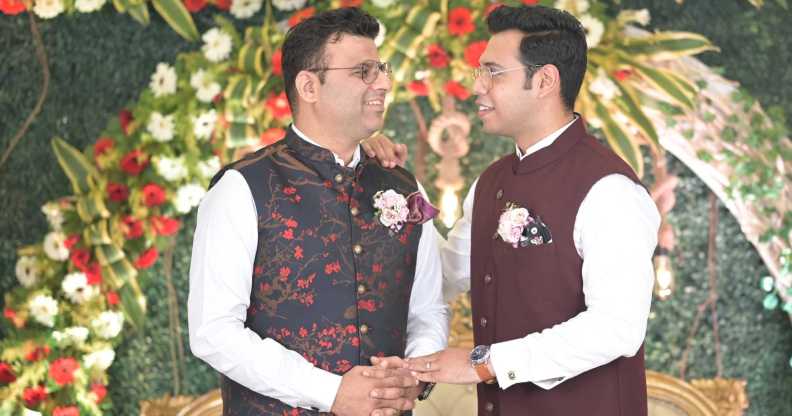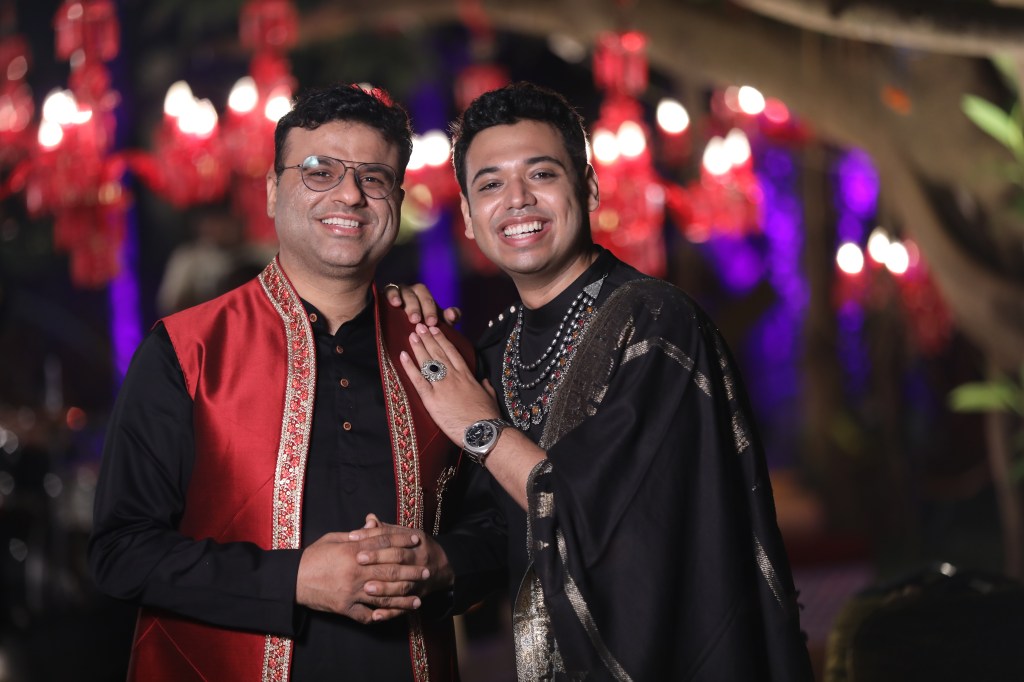India’s Supreme Court could legalise same-sex marriage. It would change these couples’ lives

Abhay and Supriyo. (Supplied)
India’s Supreme Court will soon make an historic ruling on same-sex marriage. For countless couples, the decision could be life-changing.
The court is preparing to hear a number of petitions on marriage equality, having taken up a number of pending cases from lower courts.
In India, marriage is governed by a set of religious laws, which date to the colonial era and vary among faiths, and by a secular law called the Special Marriage Act. Both define marriage as a union of a man and a woman. Legalising same-sex marriage would require an overhaul of India’s legal system, the government of India has said.
The pleas will be heard on 13 March. There’s every chance that judges could move to make marriage equality the law of the land – it was the court that decriminalised homosexuality in 2018, after all.
And while marriage wouldn’t be the end of the fight for LGBTQ+ rights in India – many argue that implementation of an anti-discrimination law is even more crucial – it would be a major step towards equality.
Supriyo, 32, and Abhay, 35, have been together for about 10 years. But in the eyes of the law, they’re strangers.

Without legal recognition of their relationship, the couple face many practical challenges.
They can’t take healthcare decisions for one another, nor can they share a health insurance policy as an opposite-sex couple would. Supriyo can’t even use their shared address for identification purposes, as the house is in Abhay’s name.
Supriyo fell ill during the COVID-19 pandemic, which made them both realise “that life is very fragile”.
“He had to be taken to the emergency room via an ambulance,” Abhay explains.
“There was a severe shortage of oxygen and hospital beds – we were regularly hearing stories of people passing away due to the illness.”
Throughout their ordeal Abhay was unable to make even the most basic of medical decisions for Supriyo, as a husband would for his wife or vice-versa. They want marriage so that they can enjoy the same rights as others – but also so that society will respect their love.
“When we talk about each other to our friends and colleagues, we use the word partner instead of the word spouse or husband. The term partner does not do justice to our relationship,” Abhay says.
“In our eyes, we are just like any other married couple, and we want the law to recognise the true nature of our relationship.
Riya, 24, and Ranmeet, 22, have been together for five years. One of the biggest challenges they’ve faced in that time is finding a place to live.
“Flat owners don’t consider us good tenants if we tell them we’re a couple and not cousins or friends,” they explain.
“During lockdown, we didn’t have any source of income to survive and we were forced to live with our families in a non-accepting environment. Also, with no communication with each other, it was hard for us to maintain a good relationship, so our mental health was deeply affected by that.”
Last year, India’s Supreme Court widened the definition of familial relationships. The court ruled that “atypical manifestations” of the family unit, including same-sex couples, are equally deserving of social benefits. However, many believe the ruling was nothing more than “lip service”, with LGBTQ+ people not materially benefiting from it at all.
It’s not enough that marriage – and adoption – are withheld from couples like Riya and Ranmeet. They also face judgement, ridicule and violence. While marriage wouldn’t necessarily solve these issues, it could move the needle towards acceptance.
“Violence by family members in the name of ‘honor killing’ is a very often seen incident with people like us,” the couple explains.
“Our marriage is not recognized by society and law, but the situation is far worse as our own people don’t see us as a couple or even humans.”
College students Kriti and Simran are among those calling for laws that would provide queer couples with protections.
They think marriage would help society see them “as just a couple, not as a ‘homosexual couple’ or an ‘odd one out’”, and that it would “help bring a sense of security” in relationships – and most importantly we will have social validation”.
“By legalising same-sex marriage, we won’t have to live in disguise in our own country.”
Some names have been changed to protect identities.
Aditya Tiwari is an award-winning poet, writer and queer activist from India. Find him on Instagram at @aprilislush.
How did this story make you feel?

